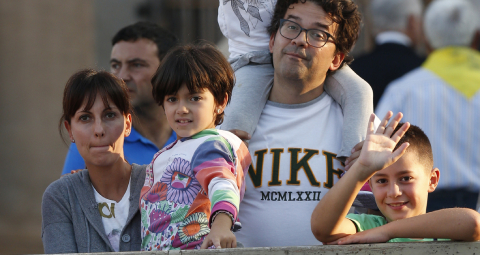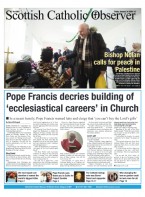November 15 | ![]() 0 COMMENTS
0 COMMENTS ![]() print
print

You can take a child from the ghetto, but Faith only thrives in a loving home
In his Letter from America, Brandon McGinley explains the vital role of the family in nurturing Catholic values and attitudes.
Recently i spoke to a woman who grew up in the Church in the 1950s—supposedly the heyday of Catholicism in America. The old ethnic city neighbourhoods were still teeming, though they were beginning to empty into the suburbs. The new parishes raised to accommodate this shift, at that point, maintained the social vibrancy of their urban ancestors. There were hero-priests in mainstream American films, and a Catholic politician—though a rather seriously compromised one—was soon to be elected president.
The woman described a lifestyle that was, on the face of it, deeply Catholic: weekly and holy day Mass, a traditional and somewhat extreme reverence for the person of the priest, regular attendance at funerals and other liturgies, a social life where the parish played a central and defining role. And yet when I asked her if there was prayer in the home, the answer was no—except for a rote blessing before meals, sometimes. She has kept that Faith into her 70s, but she is unusual among her cohort.
Matters of Faith
The assumption was that matters of Faith were the business of the Church, while the family made sure to raise competent, hopefully prosperous, citizens. At a time when the surrounding culture seemed more or less simpatico with the moral teachings of the Church, this looked like a reasonable division of labour. But the reality was that secular notions of Faith and public life were seeping into family life, even as the Church appeared to be thriving. The seeds of decline were about to germinate.
This Catholic-when-at-church, functionally-secular-elsewhere lifestyle is what I like to call ‘disintegrated Catholicism.’ It emerges from the internalisation of the notion that religious belief is essentially private—that one properly practises one’s Faith on church property and within the confines of one’s own mind.
To the extent the idea of the secular public square was accepted by thoughtful Catholics, it always came with the caveat that, of course, the family was also to be a node of religious life. If it would make everyone more comfortable, they figured, we can doff our public Catholicism in the workplace or legislature or other public venues, but the family would always remain aflame with prayer and religious influence.
Secularism
It turned out, over the decades that the lessons of secularism were learned too well, and the family succumbed to them. Parents might take their children to Mass and Catechism and the Sacraments—all churchy things that are the proper domain of the Church—but the home became an essentially sterile, secular environment. Grace before meals might occur, but of course never around guests; habitual prayer or casual catechesis as part of everyday life—that is, acting like God is genuinely sovereign for everyone, everywhere, and at every time—was uncomfortable at best, and considered bizarre and antisocial at worst.
Disintegrated Catholicism has proven to be a tremendous failure. When parents act as though Jesus Christ doesn’t matter except in church, children quickly and reasonably conclude that He doesn’t matter anywhere. The Mass and other churchy responsibilities are reduced to habits rooted in nothing but family tradition. An essentially secular home will, more often than not, produce secular children.
Sin
And so, while it’s true that due to the annoying messiness of sin, there is no foolproof way to raise Catholic children, reintegrating the practice of the Faith into the family—making it an inescapable part of every day—is absolutely essential to renewing the family and the Church. Pray with your children at home. Put images of the Gospels or the saints on the walls. Talk about Jesus and Mary and the angels as if they’re real and important—because they are.
This doesn’t require some radical, immediate transformation. Begin little by little: after all, you’re breaking down decades of habitual secularism. It will be uncomfortable. You might feel a little strange, but soon, both for you and your children, it will be the most natural thing in the world to have Jesus as a daily companion. And that, more than professional or financial or social success, is the best gift you can give them.










